He said the word has “gone. It’s useless, it means nothing now – there’s so much greenwashing happened in the name of sustainability… Everyone’s sustainable because most sustainability schemes are just the big companies getting together and rubber-stamping exactly what they’ve done with a little bit of record-keeping. ‘Of course you can use glyphosate. Of course you can use preemergent herbicides. Of course you can do all this, it’s just you’ve got to keep some records, and maybe don’t use the really, really bad ones.’ But that’s not really sustainable. Sustainable means I can keep doing this for 500 years, and it won’t have diminished the quality of the soils and the place. Sustainable doesn’t mean we’ll pass the land on slightly messed up to the next generation, but not as messed up as it would have been. That’s not sustainable. So, we really need new terms, and new ways to initiate this conversation without using the horrible S-word.”
Jamie was speaking at an event organised by World’s Best Vineyards in association with Canopy. More than 20 representatives from wineries in the new Top 50 list met at Bodegas Campillo in Rioja, Spain, to discuss sustainability in wine tourism ahead of the World’s Best Vineyards’ countdown.
The keynote speaker, in the stunning barrel room at Bodegas Campillo, was Dr Laura Catena (below), founder of the Catena Institute of Wine and managing director of Catena Zapata in Mendoza, Argentina (the estate was named the World’s Best Vineyard to visit the next day).
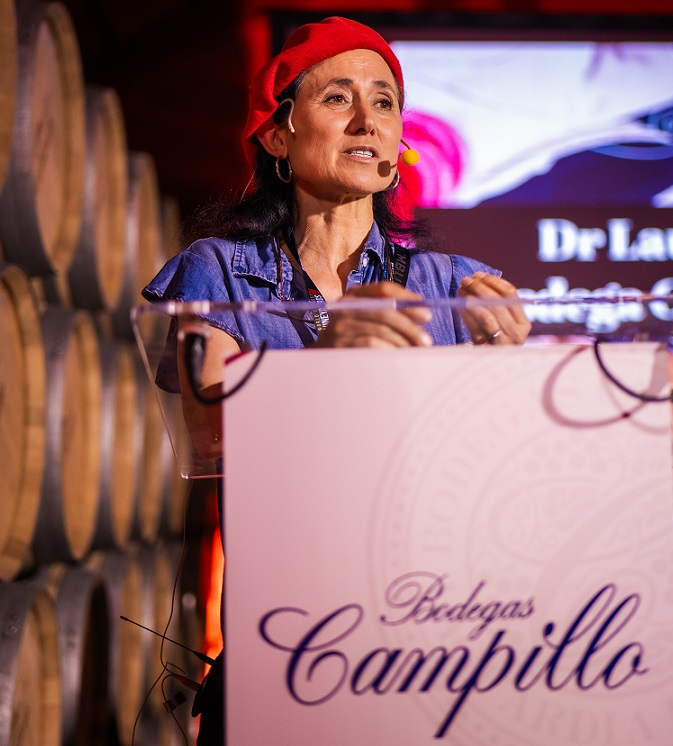
She told the gathering she was “obsessed with sustainability” and leaving “this world a better place for our children”. But she warned: “We have this incredible opportunity… However, it’s a lot harder than I thought.” She recalled a recent encounter with a lifestyle journalist from a leading newspaper in the USA. He said all his readers cared about was: “Is it organic or not? Sustainability means nothing to them.”
Laura continued: “Our customers, the importers, the distributors, they don’t talk a lot about sustainability. They’re mostly trying to sell wine. So, I think that wine hospitality has an incredible opportunity to talk about this and get the consumer to care… to change the consumer’s mind.
“I remember when I started working with my father, nobody even knew what Malbec was. But my father had this vision to make Malbec that could stand with the best of the world, and he stuck to it. Even if in the early days you would go out selling Malbec, and you might sell one out of 10 accounts because Malbec was not known. So, I am confident that we can do this, but it will take a lot of work at each one of our wineries.
“I don’t think sustainability is easy. At our winery, we do a lot of research. We collaborate with wineries. And the one encouragement I would give to anybody trying to have a very important sustainability programme is to collaborate with other local wineries and with research institutions in your community. We also collaborate with the University of Bordeaux and the University of Burgundy.”
‘We need to educate our consumers in moderate drinking’She also told the winery representatives that it was “our responsibility… to encourage responsible drinking and limited drinking”. As a part-time physician of emergency medicine in San Francisco, she believes “there’s much more good than bad” with wine “if you drink in moderation”. She added: “For our industry to survive and not have people say we are like cigarettes, which are bad in small and high quantities, we need to actually get involved and educate our consumers in moderate drinking.”
'Wine has a very privileged place'
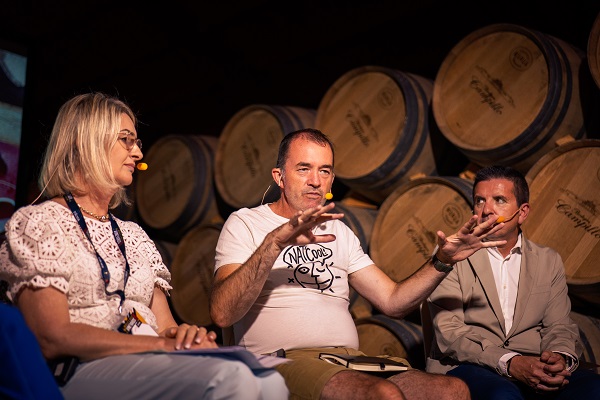
Jamie (above) picked up on the potential educational role of wineries. He pointed out that wine has a “privileged place… when it comes to connecting consumers with farming… Of all the products that are made from agricultural initiatives, wine is the one where that agriculture is closest to it. You buy tomatoes in the supermarket without ever seeing them being grown in the wild. You drink beer without ever seeing wheatfields. When you drink wine (at a winery), there’s automatically an opportunity to have a conversation about how the grapes are farmed, and how farming grapes makes a difference… I think this is the beautiful thing about wine – it introduces customers, especially when they come into wine tourism, that they come in interested to know about this product, they come in interested to know how it’s made.”
He added: “With most products, there’s a limited range of prices. With wine, you get a bottle of wine for €3, you can get a bottle of wine for €300, sometimes from the same winery. So, therefore, you have another interesting discussion as well. Why is this special? It’s not because of the bottles we use, it’s not because of the skill of the winemaker… The potential to make a €300 bottle of wine is dependent on what happens out there and the patch of land. And then suddenly you have this really interesting dialogue where you can talk about what we’re doing to help this patch of land express itself in a very interesting way. And then you’ve got a very interesting discussion with consumers. It doesn’t sound like a lecture, it’s led by their interest, but it allows you to introduce them to farming.
“And I think this is one thing we need to do more widely in our society – getting people in touch with the land, in touch with farming, to make farming not something that’s done by the cheapest immigrants you can get, but farming is something that is actually a profession… something that’s very aspirational… It’s that desire to give yourself to the land, to the place and then produce something from that place that has got character, that is life-transforming and life-enhancing and magical. And this is where wine has a very privileged place because it’s wine where people can get in contact with farming.”
Another point the wine writer and IWC co-chair made was that every region needs a place where wine tourists can start their wine journey and experience that region for the first time. He said: “I think it’s important to make wine welcoming, and inviting, I think there are some problems like Napa Valley now – the tasting fees are insane and the average price of a hotel room in Yountville at the moment is $934 for a night (Editor’s note: the average cost per night on the weekend for hotels with swimming pool in Yountville is £2,475, according to Trip.com). So, this is not an experience for normal people. This is for the wealthy.”
He thinks the ideal wine region is “very inclusive, and very welcoming, and cooperative” with “different sorts of offerings for tourism from the high end to the almost mass market. I think that’s really healthy… We’re really then introducing people to a place which initiates so many conversations around sustainability.”
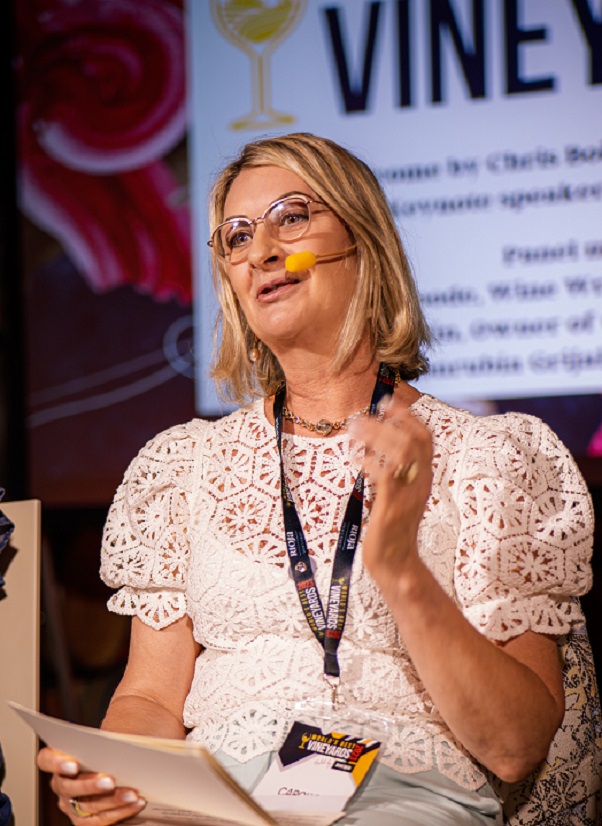
The other speakers at the event were Francisco Honrubia Grijalbo (CEO of event sponsor Bodegas Campillo) and Carolyn Martin (above). Carolyn is co-owner and creative director of Creation, a wine farm in the Western Cape, South Africa. It’s been Africa’s no1 vineyard on the World’s Best Vineyards list for the past three years and was voted no4 overall this year. She commented: “The point about sustainability is that we have these amazing wine escapes that people visit as part of wine tourism. And it’s not so much about people thinking about sustainability, but it’s about them thinking what does the place look like when it’s not sustainably run? So, people don’t necessarily make choices for sustainability, but they make choices against places that don’t actually operate in a sustainable way.”
But her main point concerned education. Creation has 17 people who have gained WSET qualifications and 13 sommeliers. “I think one of the most important factors of wine tourism is our focus on our people,” she said. “So, we recruit people from our immediate surroundings and offer them opportunities to advance their skills.”
Education is part of the sustainability measures at the farm. “We work with scientists to understand nature better,” she said. “Plant and soil scientists work with us on climate change plant health, and Creation is a source of virus-free material used to sustain South African vineyards. We even work with neurologists who help us to understand how the senses are pathways to the brain. Working with scientists helps us educate all our team, from viticulture to the tasting room and the cellardoor. The other thing about our training is that it includes leadership and communication training, and also lectures on mental health. The result is a very high retention rate and a very supportive and coherent team. And guests often remark on the warmth and the caring attitude of the tasting room team. And I really believe that that reflects on the huge investment we make in our people.
“This is so important for our long-term development strategy, for our biodiversity and values of green energy as well. Most importantly, we lead in hiring locally and respecting local labour laws. And I believe that’s the cornerstone of wine tourism.”
She also told delegates about an idea for a ‘wine visa’. “I’ve got a mission, and I hope everyone’s going to participate in this,” she said. “And it’s a fine-wine mission to broaden horizons and create a worldview. We propose a three-month global wine visa. And the idea behind that is to further bilateral relations, to assist in building cultural diversity and inclusion, and securing the future of fine wine with our friends from all around the world.”
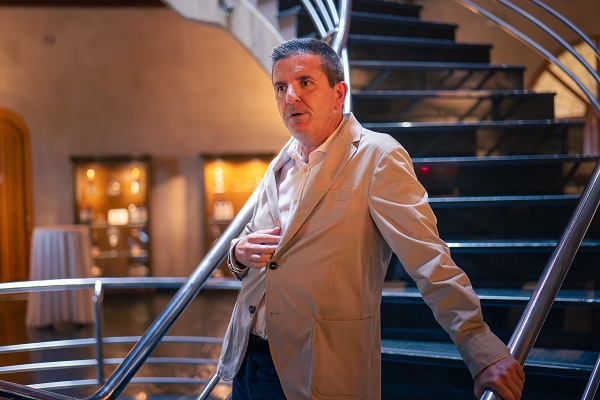
Francisco (above) of Bodegas Campillo also picked up on the educational role of wine tourism. He said: “We need to take the time in order to educate people in wine, but also to educate people in sustainability. Because most of the processes we do here in our wineries are related to sustainability.”
Contributions from the floor included Johann Henschke, from South Australian winery Henschke (no26 on the list). He was asked by Canopy’s editor, Chris Boiling, how the family business, which has been employing sustainable practices for decades, was able to balance the needs of tourists who want to visit their iconic vineyards, Hill of Grace and Mount Edelstone, with maintaining such a precious asset and such old ungrafted vines?
‘We purposefully designed the tours to be long’Johann replied: “We are very privileged to have some of the world’s oldest vines in our family… They’ve been passed through our family for six generations now. These vines are precious, but they’re also fragile, and we have to care for them very carefully. And sustainability is very important for our family, in terms of how we look after the soil, how we look after those vines. And when we take people into our vineyards, we have to be careful of them bringing in viruses and insects from their travels. So we have protocols, which mean that we have people sterilise their footwear before they leave the winery and we go in our own vehicles to the vineyard to visit the vines and we try not to go too close to the vines because some insects such as phylloxera can actually be airborne, so they can be present on our clothing and can easily jump onto the vines. So, with all of this, it’s done in a controlled way. And I guess we’re not into mass tourism. It’s very much small groups, and we purposefully designed the tours to be long, two or three hours. So that means that people are therefore learning and we want to share with them the information that we’ve learned over the many years.”
Italian winery Ceretto (no29), which has been working organically and biodynamically for 14 years, also only welcomes small groups. Hospitality manager Selena Castelnuovo said: “When we started, we tried with different kinds of groups and we figured out right away that to really educate people it was better to do it with smaller groups. We think that with smaller groups you get more focus, you can create the relationship, you can go deeper in the conversation and really make them understand the thought that you say.”
She also pointed out: “When you create the relationship, then people will come back.”
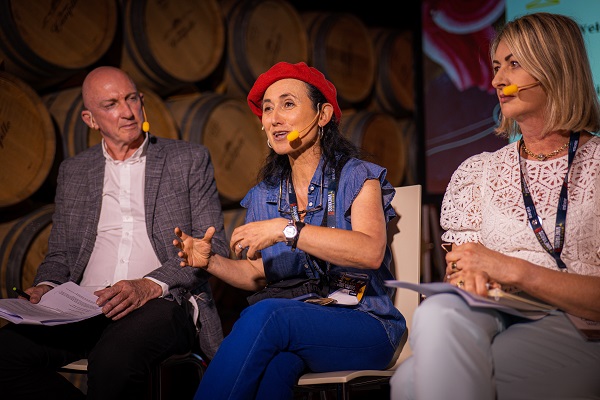
While looking for ways to get the message across, Laura (centre) suggested telling real stories. She encourages her team members to become storytellers and monitor the reaction of their guests. She said: “I can tell when people like the way I told the story or not. That’s my system, and I encourage my team to do the same thing as they tell a story. If people liked it, tell it again. But have it be your own story that you tell.”
With thanks to our sustainability partner Bodegas Campillo for hosting this event.

 English
English French
French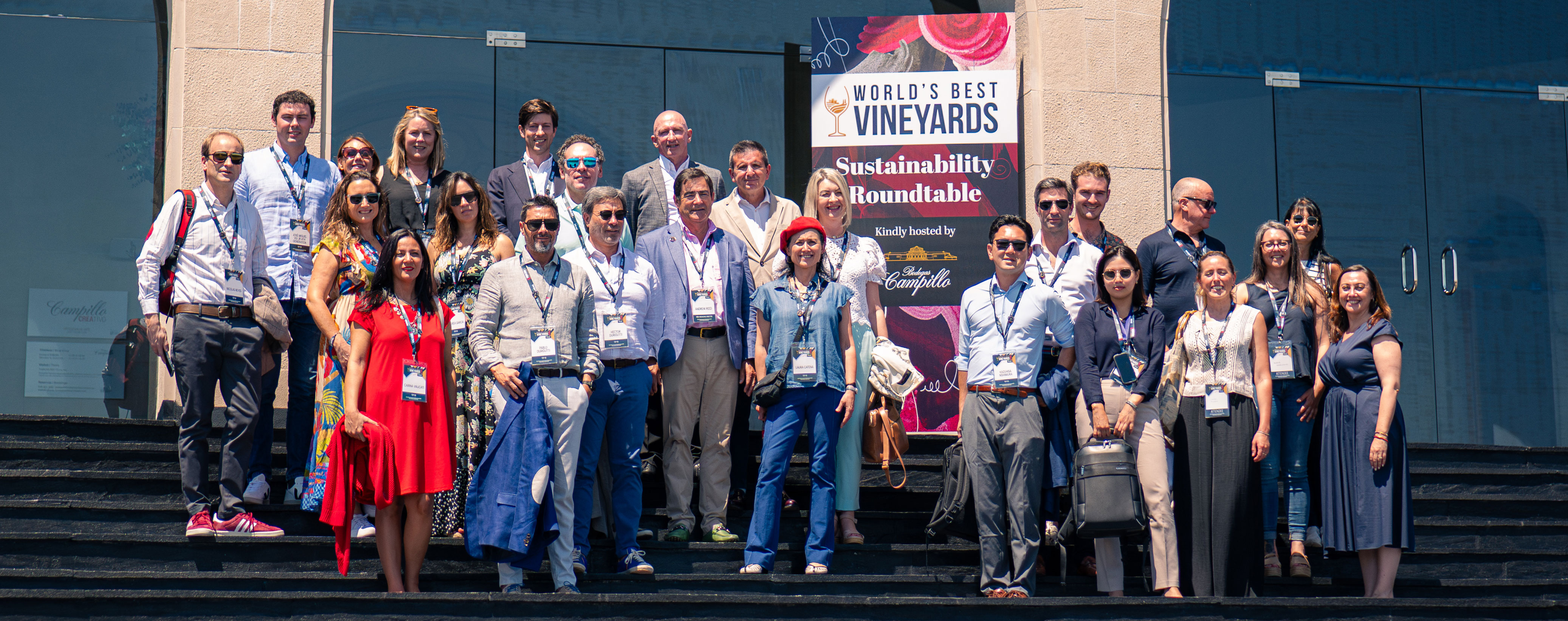







.png)


